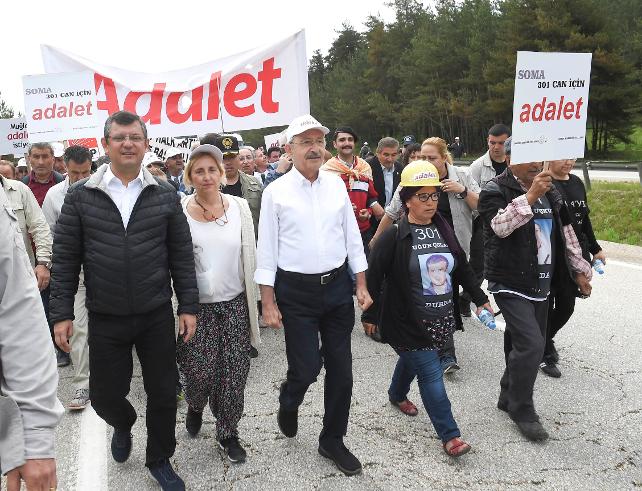Optimism in Action
by Tarık Günersel / June 23, 2017 / No comments

Turkish opposition leader Kemal Kılıçdaroğlu (in white, center), the head of the secular democratic CHP. Image via the author.
opPRESSion
The present situation in Turkey is worse than the period of the 1982 constitution imposed by the military after the coup d’etat in 1980. This was the conclusion of the UN Human Rights reporter David Kaye. The Turkish representative Hüseyin Müftüoğlu refused this accusation, arguing that the government has been defending citizens’ rights against various terrorist organizations.

- Life is words in action, literature is action in words.
- Humans are about to destroy their spaceship Earth. Some of them are aware of this and they try to change the course of events. Will they succeed? Will more humans be alarmed and do something?
- Literature is vital and translators are messengers of world peace.
- Though I shall focus on the literary scene in Turkey and its problems regarding freedom of expression, I shall not omit the other parts of our planet. Today local is global and vice versa.

- Poet, playwright, actor, and director Tarık Günersel worked at Istanbul City Theater as a dramaturg.
- His works include Breaths of Infinity (a mosaic of poems) and My 300th Birthday Speech (short stories). His Becoming consists of his aphorisms and various ideas from world wisdom.
- His plays include Billennium, Nero and Agrippina, Sociology of Shit, Threat and Virtually Yours. He has written four libretti for the composer Selman Ada: Ali Baba & 40, Blue Dot, Forbidden Love, and Another Planet. His translations into Turkish include works by Arthur Miller, Samuel Beckett, Vaclav Havel and Savyon Liebrecht. His presentation of World Poetry Day to PEN International in 1997 led to its adoption by UNESCO. As the former president of PEN Turkey Center he was elected to PEN International Board in Tokyo from 2010 to 2012. In 2013 he initiated the Earth Civilization Project with the collaboration of several intellectuals from around the planet.
So many people have been squeezed into the category of “terrorism that the question,” “Who isn’t a terrorist?” has become more practical than asking who is one. Lawyer and human rights defender Taner Kılıç, chair of the board of Amnesty International’s Turkey section, was detained by the Anti-Terror Branch of the Izmir police on June 6; his home and office were searched in relation to the ongoing investigation into people associated with the Fethullah Gülen movement.
Nowadays nearly all accusations in Turkey are made in association with the Gülen movement. Erdoğan’s AK Party government refuses to inquire into the political connections of the Gülenist coup attempt. Does this not appear a bit suspicious? Does it not weaken Erdoğan’s position regarding the credibility of his claims about the abortive coup d’etat?
Lawyer and leading politician Hüsamettin Cindoruk has criticized Erdoğan’s government, saying that the multiparty system has been destroyed: “Though I’m not a socialist, I criticized the capitalist class because they failed to be democratic; it is a shame that the newspapers Cumhuriyet and Sözcü have been under attack.” He added that we should democratize our regime to such an extent that there will be no need or demand for a separate state for our Kurdish citizens.
Authoritarian? Despotic.
Miscommunication is part of any intercultural interaction. For many people in Turkey, the term “authoritarian” may carry a different connotation from one we generally understand. Our common understanding of the term normally invokes a negative connotation, such as “dictatorial” or “domineering.” Contrary to this common definition of the word, some people in Turkey misread the word “authoritarian” and give it a positive meaning. They think that when Westerners call Erdoğan “authoritarian,” they are calling him “good!” In their minds, they think that’s how a good father, and thus a leader, should be. So instead of using “authoritarian”-related words to describe the present government in Turkey, we should use words that by definition are more accurate, like “despotic.” Otherwise, contrary to our intention, we could be supporting despotism.
The Importance of Optimism
Pessimism can only lead to surrender. Critical optimism is a basic source of life energy; it can help us improve life if we take concrete steps. How else could self-esteem transcend pretension?
Here are some examples of optimism in action:
Writers in prison: The PEN Int’l Case List has recently been published. The comprehensive international documentation includes the situation in Turkey, too.
Linguistic Rights: “Culture’s Oxygen” is the title of the recent report of PEN International: http://www.pen-international.org/wp-content/uploads/2017/02/Cultures-Oxygen-The-PEN-Report.pdf
Vital Women’s Issues: A VIO (Very Important Organization): http://www.womenforwomen.org
Children’s Issues: Goodwill transcends obstacles. My dear friends Carl and Sharon Kotapish, who lived in Nepal for years, initiated “Nepal Outreach” to create funds for education. They have been supporting another organization, Forward Looking, founded by Purushotam Nepali 15 years ago: http://forwardlooking.org.np
May good energies meet.




